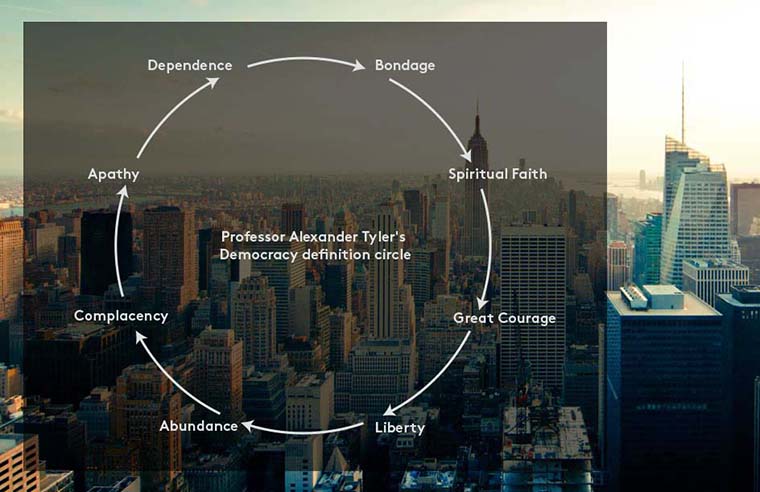Democratic processes are time sensitive to a circular sequence which without continual adjustment will move to complete the circle and return to the very base human trait of personal greed. Professor John Olson of Hamline University School of law in St Paul Minnesota believes our international democratic model is somewhere in the region of 60% around the democracy definition circle described by Professor Tyler and thus requires an immediate adjustment to survive.
This got me thinking about our business and company structures. Over the years our economies and financial institutions have shaped and influenced the corporate structures which we take as essential in today’s business environment. We’re light years away from the village council where the leader sat on a chair in a barn (from where the term Chairman originated) with the local populace squatting on the floor making decisions which influenced the wellbeing and economic prosperity of the village. But I wonder, albeit on a far larger scale, if our corporate structures, ownership responsibilities and technical development don’t follow a similar circular pattern to Professor Tyler’s democracy circle and therefore require major adjustments from time to time in order to survive. The 2008 financial meltdown should be a warning that corporate structures and the drivers which underpin their existence aren’t sufficiently robust to withstand major catastrophic events. They require continual attention which growth and profit alone (while they may disguise and cloud the real issues) cannot be relied upon to provide a platform for continual prosperity in the future.
Other comments by Professor Tyler on the subject of democracy can also apply to our corporate and business structures of today. For example he states, “A democracy will continue to exist up until the time that voters discover that they can vote themselves generous gifts from the public treasury.” From that moment on, the majority always vote for the candidates who promise the most benefits from the public treasury with the result that every democracy will finally collapse over loose fiscal policy which is always followed by a dictatorship.
Perhaps these principles might apply to short term investors in today’s market? Maybe such a philosophy, when applied and tested against the structures and inherent financial drivers of our various international publicly traded stock markets, may send out cautionary signals that some form of adjustment is required to keep them performing at their optimum level.
At the core of Professor Tyler’s philosophy is that the status quo, regardless of what quadrant within the circle has been achieved, will slowly begin to deteriorate and eventually fail without continual review and adjustment. While the Professor’s comments were made in 1887 and focused on democracy as an institution the message still resonates with a great deal of truth today when applied to our corporate business world. There are numerous stages of the circle which one can’t argue with and which if not addressed can destroy a business. For example abundance can breed complacency, apathy can introduce dependence it’s a matter of recognising these traits in a business sense and making the necessary adjustments to rectify the situation.
I don’t know what all the answers are to some of the issues that such thought provoking comments made one hundred and fifty years ago might have, if any, on our corporate business models of today. However at the very least such comments might get us thinking and questioning in a positive manner our current company structures and the drivers which underpin our corporate world.
"We’re light years away from the village council where the leader sat on a chair in a barn with the local populace squatting on the floor making decisions..."
